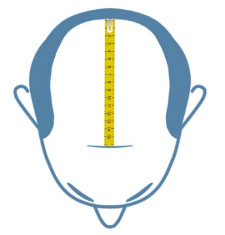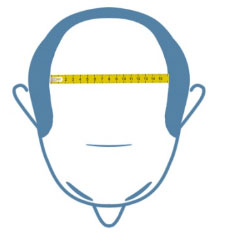Yes—you absolutely can swim in a pool, lake, or the open ocean while wearing a modern hair system. When you prep the bond correctly, rinse after your dip, and follow a sensible maintenance rhythm, the unit stays put and looks natural. The rest of this guide walks you through every step so you can enjoy the water without worrying about slip-ups, frizz, or scalp irritation.
Why Water Raises Questions For Hair Systems
Common Beginner Fears (Slip, Damage, Embarrassment)
First-time wearers picture the worst-case scenario: leaping off the diving board and watching their “new hair” float away while friends gasp in horror. Less dramatic but just as real are worries that chlorine will fry the fibers or that a slicked-back wet look will expose the lace front. Those fears are normal, but modern adhesives and a few smart habits make them largely unfounded.
How Adhesives And Base Materials React To Water
-
Adhesives: Daily-wear tapes are wonderful for office life, not so great for pool life—they soften in chlorinated water. By contrast, maximum-wear liquid glues and waterproof tapes form a hydrophobic seal that’s unfazed by a cannonball splash.
-
Bases: Lace bases breathe well and let water pass through, but they need a little extra edge security. Thin-skin poly bases repel liquid yet can trap moisture against the scalp if you don’t dry them thoroughly.
-
Hair fibers: Human hair reacts like your own—chlorine strips moisture, salt dehydrates, and UV light fades color. Quality synthetics shrug off UV but can feel “crunchy” without conditioner.
Preparing Your Unit Before The First Dip
Choosing A Waterproof Adhesive Or Tape That Fits Your Skin
Pick your bond by lifestyle and skin type—think of it like choosing sneakers for the right sport:
Apply adhesive to clean, oil-free skin; press the base down methodically; then allow a full cure period (below).
The 24-Hour Cure Rule And A Simple Sink Test
Adhesives polymerize as solvents evaporate. Give them at least 24 hours—48 if humidity is high. Before you drive to the beach, lean over a sink filled with water, submerge for 30 seconds, and tug gently at each corner. No lift? You’re good.
Optional Shields: Leave-In Conditioner, Swim Cap, Headband
-
Pre-wet & condition: Saturate the system with clean water and a detangling leave-in so the cuticle can’t soak up chlorine like a sponge.
-
Swim cap: A silicone or Lycra cap cuts drag and prevents edge flutter during flip-turns.
-
Headband or bandana: Ideal for paddleboarding or beach volleyball when a full cap feels hot—keeps front edges flat without trapping heat.
Smart Habits While You’re In The Pool Or Ocean
Entering The Water: Step, Slide, Don’t Slam
A gentle dive isn’t dangerous; a high-velocity belly flop or backflip can create a sudden shear force right at the hairline. Walk down the pool steps or angle your body so water first hits the crown, not the frontal edge.
Mid-Swim Edge Check—What To Do If Corners Lift
During a rest break, run a finger along your temple. If you feel a flap, press it flat, leave it alone until dry land, then:
-
Pat the area dry with a towel.
-
Swipe with an alcohol wipe.
-
Apply a pre-cut tape tab or dab of liquid bond.
-
Hold for 30 seconds—problem solved in under two minutes.
Surf, Dive, Jet-Ski: Extra Precautions For High-Impact Sports
High-speed impacts and helmet straps demand redundancy. Double your perimeter tape, add a thin layer of liquid glue over it, and wear a neoprene surf cap or helmet liner. Tuck a tiny solvent pen and spare tabs in your gear bag so a mid-session fix never ends the fun.
Post-Swim Care That Keeps Hair And Scalp Healthy
Immediate Fresh-Water Rinse And Chelating Shampoo
Chlorine bonds to hair in minutes; salt leaves crystals behind. A lukewarm shower within 15 minutes is ideal. Once a week, lather with a chelating shampoo (look for EDTA or citric acid on the label) to dissolve minerals and pool chemicals.
Deep Conditioning, Cool Blow-Dry, UV Protection
Massage in a silicone-free deep-conditioner, leave it ten minutes, rinse, then pat the base dry—never rub. Blow-dry on a cool setting, lifting sections so air reaches the underside of a lace base. Finish with a UV-shielding spray to guard color if you swim outdoors.
Re-Bond Timing For Frequent Swimmers
Water accelerates natural adhesive breakdown. If you usually re-bond every four weeks, reduce the interval to three if you swim daily and two if you’re also using saunas or hot tubs.
Cost, Products, And Travel Planning
Waterproof Adhesive Comparison At A Glance
Backup Unit & Mini Touch-Up Kit For Vacations
Pack a spare thin-skin topper (dries fast), travel-size adhesive, curved scissors, cotton swabs, and a 30 ml solvent spray. Everything fits in a toiletry pouch and turns a potential emergency into a two-minute touch-up.
Budgeting Extra Maintenance Time And Supplies
Count on using 20–30% more adhesive and conditioner during peak swim months. Also plan an extra 15 minutes per day on holiday for a quick rinse, condition, and cool dry.
Frequently Asked Questions (Beginner Edition)
How Soon After Installation Can I Swim?
A full 24 hours minimum; 48 if you live in high humidity or used extra adhesive layers. The wait lets solvents evaporate and the bond cure.
Will Hot Tubs Or Saunas Loosen My Bond?
Yes. Prolonged heat softens even maximum-wear adhesives. Limit sessions to ten minutes, keep your head above water when possible, and cool your scalp afterward.
Does Regular Swimming Shorten The Unit’s Lifespan?
It can—only if you skip rinsing and conditioning. Follow the rinse-chelate-condition routine and you’ll retain about 80–90% of a non-swimmer’s lifespan.
Final Checklist And Next Steps
Pre-Swim 5-Point Checklist You Can Screenshot
-
Douse with fresh water or leave-in conditioner.
-
Edge check—press down any loose corner.
-
Have cap or headband in your bag.
-
Adhesive wipes + spare tape tabs packed.
-
Shower or bottled-water rinse lined up within 15 minutes post-swim.
When To Seek Help From A Professional Stylist
-
Persistent edge lift before the two-week mark.
-
Scalp redness that lasts more than 24 hours.
-
Matted, faded hair even after conditioning—may need clarifying treatment or partial replacement.
Discover Your Perfect Hair System with LaVividHair
Ready for a hair system that’s built around you? Visit LaVividHair and chat with our dedicated support team for one-on-one guidance. We custom-craft units to match your head size, color, density, and lifestyle, using 100 % human hair and ultra-light, breathable bases that look—and feel—completely natural. Choose from in-stock or fully bespoke options, enjoy fast worldwide shipping, and care kits that keep everything secure. Questions? Reach out anytime and let us help you dive back into life with total confidence.




Comments (0)